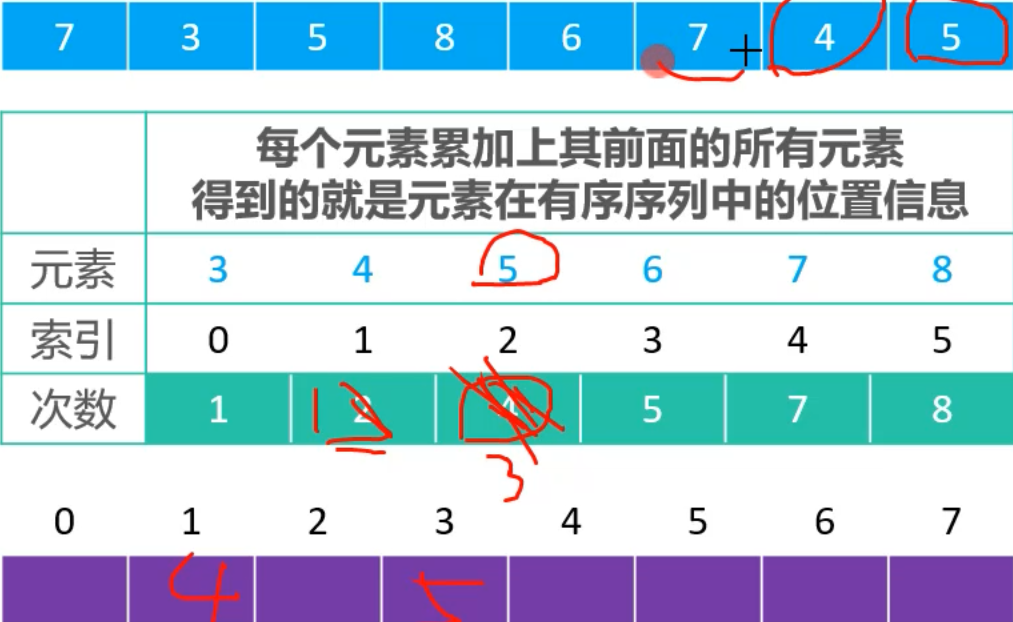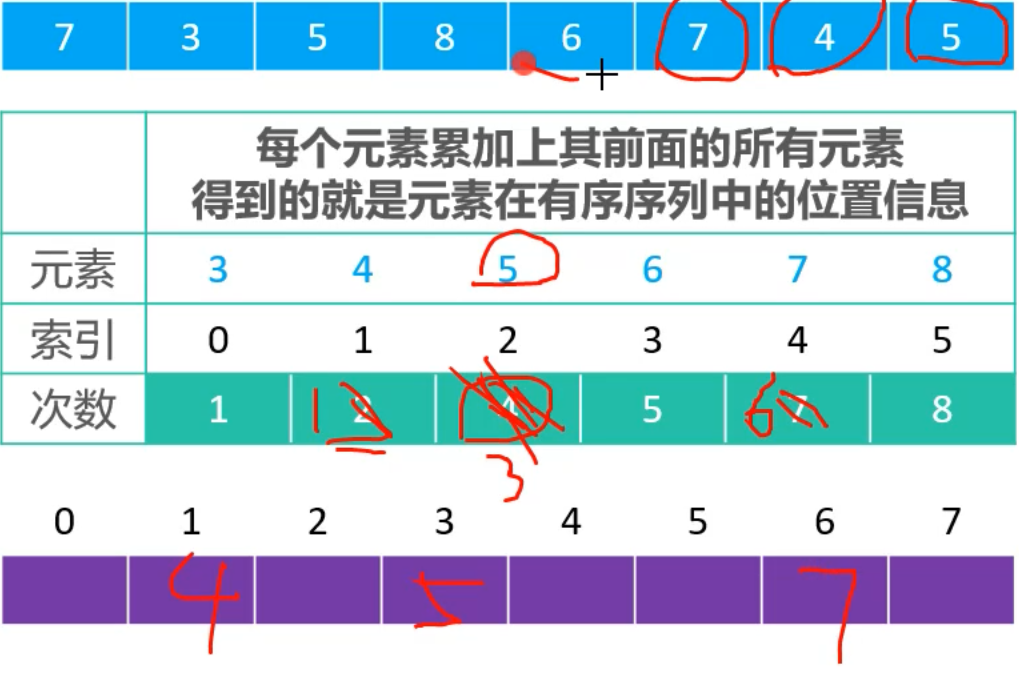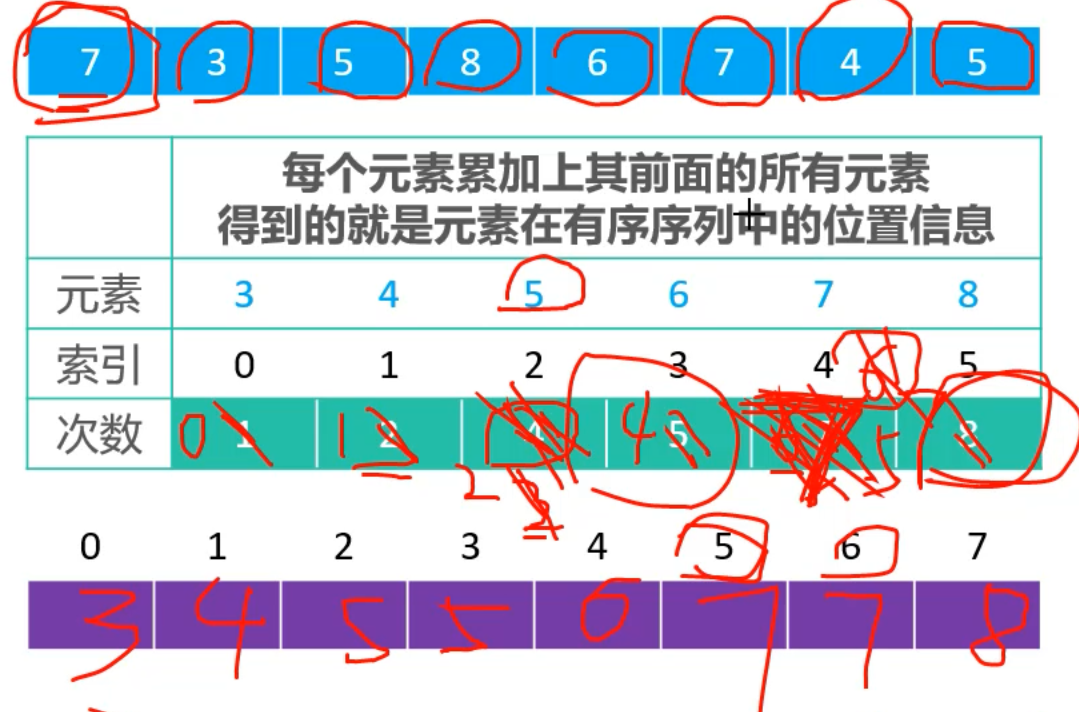Summary
- Bubble, Select, Insert, Merge, Fast, Hill, Heap Sort, are all sort based on comparison
- The lowest average complexity is O(nlog(n))
- Count, bucket, cardinality sort, not comparison-based sort
- Is a typical space-exchange time, and in some cases, the average time complexity can be lower than O(nlog(n))

Core Ideas
- Count the number of occurrences of each integer in the sequence and derive the index of each integer in the ordered sequence
Execute process
- First you need to find the maximum max in the array or set arr that needs to be sorted
- Create an array counts of length max + 1[]
- Traversing through an array counts[arr[i]++ for each value in the array that counts the number of different values in the array;
- Then iterate through the counts array, putting the value at the index that is not 0 in turn in the arr array
Example



Code (Version 1)
public class CountingSort {
public static void sort(int[] arr) {
//Find the Maximum
int max = arr[0];
//Array length
int n = arr.length;
for (int i = 1; i < n; ++i) {
if (arr[i] > max) {
max = arr[i];
}
}
//Open up memory space to store the number of occurrences of each integer
int[] counts = new int[1 + max];
//Count the number of occurrences of each integer
for (int i = 0; i < n; ++i) {
++counts[arr[i]];
}
//Sort integers according to the number of times they occur
int index = 0;
for (int i = 0; i < counts.length; ++i) {
while (counts[i]-- > 0) {
arr[index++] = i;
}
}
}
public static void main(String[] args) {
int[] arr = new int[]{7,1,2,3,4,5,6,6,7};
sort(arr);
System.out.println(Arrays.toString(arr));
}
}
test

Problem
- Negative integers cannot be sorted
- And its waste of memory space
- Is an unstable sort
Code (Version 2) (Resolve the above problem)
public static void sort(int[] arr) {
int n = arr.length;
if (n <= 1) {
return;
}
//Find the Value
int max = arr[0];
int min = arr[0];
for (int i = 1; i < n; ++i) {
max = Math.max(max, arr[i]);
min = Math.min(min, arr[i]);
}
//Open up memory space, storage times
int[] counts = new int[max - min + 1];
//Count the number of occurrences of each integer. The index of the elements in the ARR array corresponding to the counts array is arr[i] - min.
for (int i = 0; i < n; ++i) {
++counts[arr[i] - min];
}
//counts array is no longer saved number of times, change it to prefix and
for (int i = 1; i < counts.length; ++i) {
counts[i] += counts[i - 1];
}
//Staging all elements with a new array
int[] newArray = new int[n];
int i = n - 1;
//Traverse the element backwards and forwards, placing it in an appropriate place in an ordered array to ensure stability
while (i >= 0) {
//--counts[arr[i] - min]: Find a new location for arr[i]
newArray[--counts[arr[i] - min]] = arr[i];
--i;
}
//Assigning an ordered array back to its original array
while (++i < n) {
arr[i] = newArray[i];
}
}
Complexity
- Time complexity: O(n + k),n is the number of elements, K is the range size of elements [min, max]
- Spatial complexity: O(n + k),n is the number of elements, K is the range size of elements [min, max]
test

Execution process (illustration)
- Original Array

- Find the min and Max in the array, define a new counts array, size max - min + 1, to store the number of occurrences of each element

- Find the prefix and sum of the counts array

- Then traverse the original array from right to left
- The first element on the right, 5, corresponds to the prefix of the counts array and 4,4 minus itself. The resulting 5 is subscript 3 in the array and put in, where a new array is used to temporarily store the data

- It then traverses to 4,4 corresponding to the prefix and 2, -2 in the counts array, so the index for 4 is 1

- Then iterate through the 7,7 prefix in the counts array and the corresponding sum is 7,7 - so the new index position is 6

- . . .
- Then, as above, the final result is

Use scenarios
- Sort numbers with a range